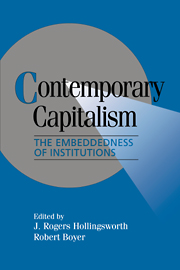Book contents
- Frontmatter
- Contents
- Acknowledgments
- List of Contributors
- Chapter 1 Coordination of Economic Actors and Social Systems of Production
- PART I THE VARIETY OF INSTITUTIONAL ARRANGEMENTS AND THEIR COMPLEMENTARITY IN MODERN ECONOMIES
- Chapter 2 The Variety and Unequal Performance of Really Existing Markets: Farewell to Doctor Pangloss?
- Chapter 3 A Typology of Interorganizational Relationships and Networks
- Chapter 4 Associational Governance in a Globalizing Era: Weathering the Storm
- Chapter 5 Constitutional Orders: Trust Building and Response to Change
- PART II HOW AND WHY DO SOCIAL SYSTEMS OF PRODUCTION CHANGE?
- PART III LEVELS OF SPATIAL COORDINATION AND THE EMBEDDEDNESS OF INSTITUTIONS
- PART IV CONCLUSION
- Index
Chapter 4 - Associational Governance in a Globalizing Era: Weathering the Storm
Published online by Cambridge University Press: 05 June 2012
- Frontmatter
- Contents
- Acknowledgments
- List of Contributors
- Chapter 1 Coordination of Economic Actors and Social Systems of Production
- PART I THE VARIETY OF INSTITUTIONAL ARRANGEMENTS AND THEIR COMPLEMENTARITY IN MODERN ECONOMIES
- Chapter 2 The Variety and Unequal Performance of Really Existing Markets: Farewell to Doctor Pangloss?
- Chapter 3 A Typology of Interorganizational Relationships and Networks
- Chapter 4 Associational Governance in a Globalizing Era: Weathering the Storm
- Chapter 5 Constitutional Orders: Trust Building and Response to Change
- PART II HOW AND WHY DO SOCIAL SYSTEMS OF PRODUCTION CHANGE?
- PART III LEVELS OF SPATIAL COORDINATION AND THE EMBEDDEDNESS OF INSTITUTIONS
- PART IV CONCLUSION
- Index
Summary
The growth of international competition and trade in the postwar period, at first blush, would not appear to provide a context especially favorable for the assumption of governance roles in the economy by interest associations. In many capitalist states, neoliberal ideologies that favor the globalization of economic relations have gained significant influence within the classe politique. These ideologies celebrate the virtues of markets as the preeminent governing mechanisms, laud their efficiency, and postulate their capacity to increase the general good of all. Championed as extraordinary, “natural” allocative instruments, markets, it is suggested, must be left free to weave their magic. Consistent with this neoliberal ideology are policies that promote markets at the expense of other governing structures and that seek to dismantle alternative governance arrangements when they exist. The ideologically committed dismiss all attempts by the state to approach economic policy in an anticipatory fashion. The idea of state intervention is attacked as protectionist, inefficient, and self-serving for backward private interests.
Interest associations might not be expected to fare well as governance mechanisms in this neoliberal world. At the sectoral level, neoliberals perceive them to be the servants of corrupt special interests that refuse to face the bracing world of international competition. At the macro level, they are branded disdainfully as “corporatist,” a term that hints at market interference and at collusion among the state, big capital, and big labor. The reactive approach to policy favored by neoliberal governments has little room for associations. Willis and Grant's (1987) concept of the “company state” underlines these implications.
- Type
- Chapter
- Information
- Contemporary CapitalismThe Embeddedness of Institutions, pp. 127 - 153Publisher: Cambridge University PressPrint publication year: 1997
- 16
- Cited by



